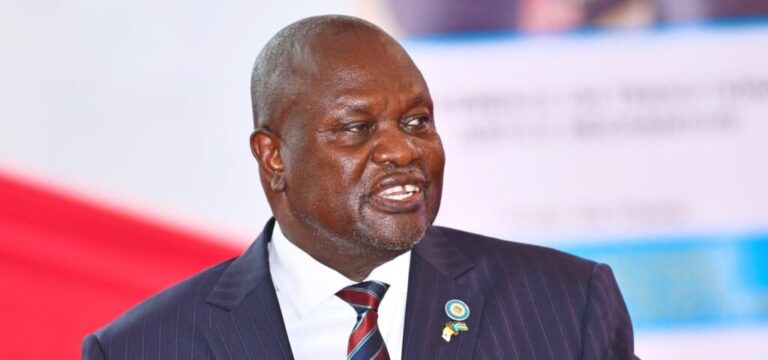The defense team for suspended First Vice President Riek Machar told the special court on Monday that four of his key allies have disappeared since being taken from his residence in March.
During the court’s 15th session at Freedom Hall, defense lawyer Kur Lual Kur questioned lead investigator Maj. Gen. Basilio Thomas Wani about the whereabouts of four men — Brig. Gen. Mark Didi Yoah , Brig. Gen. Par Dang Yuot, Brig. Gen. Kuok Dang Yiel, and Maj. Hoth Chiok — who were allegedly detained when security forces placed Machar under house arrest on March 26.
“These four individuals were taken from the residence of the fifth accused, Dr. Riek Machar Teny. They have neither been released nor brought before this court. Where are they?” Kur asked.
In response, Wani testified that the four individuals “did not appear in the investigation” and that he did not know their current whereabouts.
Machar, 73, a central figure in South Sudan’s civil conflict, and seven co-defendants face charges including mass murder, treason, crimes against humanity, and destruction of property.
The charges arise from a March 2025 assault on an army base in Nasir, in which more than 200 government soldiers were killed. Prosecutors allege the attack was carried out by forces loyal to Machar’s SPLA-IO and a local militia known as the White Army.
Defense Challenges Investigation’s Credibility
During cross-examination, Kur pressed Wani on the origins of the case and any potential undue influence, asking whether he was aware that senior government officials had publicly accused the SPLM-IO of orchestrating the Nasir assault before the official investigation began. Wani replied that he was not aware of such statements.
“Do you agree with me that some government officials — including Michael Makuei, Vice President Taban Deng Gai, Gen. Johnson Olony, Vice President Benjamin Bol Mel, and Gen. James Koang — accused SPLM-IO officials of involvement in the Nasir incident before the case was opened?” Kur asked.
Kur further questioned whether Wani had personally visited Nasir to verify the alleged attack. Wani said he had not, citing insecurity in the area.
Evidence Transfer Under Scrutiny
Much of the hearing focused on the handling of evidence allegedly seized from Machar’s residence. Testimony indicated that electronic devices, firearms, and other materials were confiscated by the National Security Service (NSS) and later handed to an official investigation committee.
Wani told the court that a diplomatic bag containing some of the seized evidence was sent to Pretoria, South Africa, for examination via the Ministry of Foreign Affairs. The bag was handled through South Sudan’s embassy in Pretoria under the supervision of Ambassador Denis Dumo, who later oversaw its return to Juba.
“The diplomatic bag was opened in the presence of the ambassador at our embassy in South Africa. It was then formally handed over to a private expert and later returned to Juba, where it was received by the investigation committee,” Wani testified.
He clarified that Dennis Dumo was not part of the investigation team but was appointed by the ministry solely to facilitate the diplomatic transfer.
Defense lawyers challenged the legality of the process, questioning whether the evidence had been properly authenticated and whether South Sudan has any formal agreement with South Africa on the handling of criminal evidence through diplomatic channels.
“I do not know if such an agreement exists,” Wani responded, adding that international cooperation on criminal matters “normally occurs at the government-to-government level.”
The defense also asked whether all seized items were properly documented and accounted for. Wani maintained that all materials were handled jointly by the investigation committee and the National Security Service (NSS), and later presented to the court as exhibits.
Testimony further confirmed that the investigation committee was established after the initial arrests had already been made.
The prosecution requested that the defense submit corrected legal documents before responding to some of the defense’s procedural challenges.
The presiding judge adjourned the hearing to Friday, Oct. 31, when cross-examination of additional witnesses is expected to continue.
The other defendants are Puot Kang Chuol, 40; Mam Pal Dhuor, 37; Gatwech Lam Puoch, 66; Lt. Gen. Gabriel Duop Lam, 53; Camilo Gatmai Kel, 47; Mading Yak Riek, 45; and Dominic Gatgok Riek, 27.




